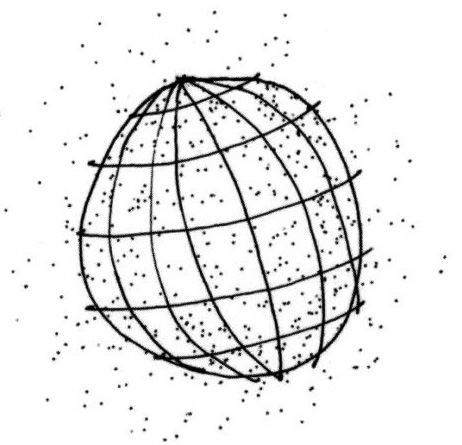 Many years ago, Craig Burton shared the best metaphor for the Internet that I have ever heard, or seen in my head. He called it hollow sphere: a giant three-dimensional zero. He called it that because a sphere’s geometry best illustrates a system in which every end, regardless of its physical location, is functionally zero distance away from every other end. Across the nothing in the Net’s hollow sphere, every point can “see” every other point, and connect to it, as if distance were not there. And at no cost.
Many years ago, Craig Burton shared the best metaphor for the Internet that I have ever heard, or seen in my head. He called it hollow sphere: a giant three-dimensional zero. He called it that because a sphere’s geometry best illustrates a system in which every end, regardless of its physical location, is functionally zero distance away from every other end. Across the nothing in the Net’s hollow sphere, every point can “see” every other point, and connect to it, as if distance were not there. And at no cost.
It doesn’t matter that the Net’s base protocol, TCP/IP, is not perfect, that there are costs and latencies involved in the operation of connections and routers between end points — and that many people in the world still do not enjoy the Net’s graces. What matters is that our species’ experience of the Net, and of the world it creates, is of zero distance and cost. You and I can publish posts like this one, or send emails to each other, or even have live video conference calls, with little if any regard for distance and cost.
Our experience of this is as essential to our future as the discovery of language and fire was to our ancestors. The Net has already become as essential to human agency — the capacity to act with effect in the world — as the wheel and movable type. We are not going to un-discover it.
Yes, companies and governments can control or access to the Net, and sphincter what passes through it; but it’s too late for anybody or anything to keep our species from knowing what it’s like to be zero distance apart at zero cost. We now have that experience, and we will use it to change life on Earth. Hopefully for the better.
The Giant Zero of the Net has an analogue with the physical world, whose gravity pulls us all toward an invisible center we can’t see but know is there. As with the Net’s zero, we live on Earth’s surface. The difference is that, on the Earth’s zero, distance matters. So does the inverse square law. Sound, sight and radio waves fade across distances. We need to be close to hear and see each other. Not so on the Net.
The Giant Zero is also the title of my next book. Until then, if you dig the metaphor, you might also source World of Ends or NewClues, both of which are co-written by David Weinberger. For now I just want to post this so I can source something simple about The Giant Zero in one link.
HT to @dweinberger: every hyperlink travels across the zero. And thanks to Hugh McLeod for the image above. Way back in 2004, I asked him to draw me the Internet, and that’s what he did. I haven’t seen anything better since.
Leave a Reply